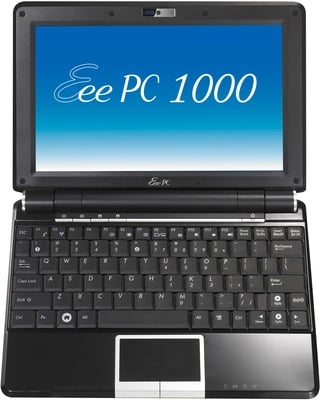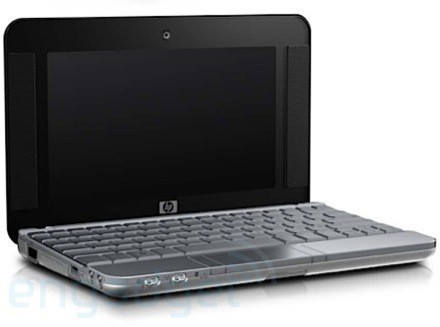Steve Ballmer in characteristic form at the Gartner conference, managing somehow to overlook the fact that Linux is now taking over the Netbook market. Also talking his usual baloney about the intellectual property issues in Open Source.
Category Archives: Linux
New ASUS EeePC on the way
From Register Hardware…

Asus has announced the anticipated Intel Atom-based Eee PC – and a pair of new models that, the company claimed, boost battery life to more than seven hours. Oh, and they sport 10in displays, hard drives and 802.11n Wi-Fi.
As expected, the new version of the current 8.9in Eee PC 900 is the 901, while the 10in versions are dubbed the 1000 and 1000H – the former has Linux, the latter Windows XP Home. Both have a keyboard that’s only eight per cent smaller than a standard laptop keyboard…
No firm info on UK prices, but my guess is >£300+VAT.
Now a 7-hour Linux sub-notebook would be something…
Child’s play?
This morning’s Observer column…
For some months, strange goings-on have been reported in branches of Toys ‘R’ Us. Shifty-looking middle-aged men and younger males wearing ponytails and Grateful Dead T-shirts have been observed leaving the premises with small cardboard boxes which they then gleefully tear open upon reaching the safety of their cars. Exclamations of ‘Yes! And ‘Yeehaw!!!’ have been heard by security guards, who are as puzzled by all this as their checkout colleagues.
‘I can’t figure it out,’ said one store manager, when quizzed by this columnist a few months ago. ‘The things are just walking out of the store. They sell out the minute we get a delivery.’
HP enters sub-notebook market
Microsoft rattles patent sabre — again
From Tech News on ZDNet
Microsoft claims that free and open-source software violates 235 of its patents, according to a magazine report published Sunday.
In an interview with Fortune, Microsoft top lawyer Brad Smith alleges that the Linux kernel violates 42 Microsoft patents, while its user interface and other design elements infringe on a further 65. OpenOffice.org is accused of infringing 45, along with 83 more in other free and open-source programs, according to Fortune.
It is not entirely clear how Microsoft might proceed in enforcing these patents, but the company has been encouraging large tech companies that depend on Linux to ink patent deals, starting with its controversial pact with Novell last November. Microsoft has also cited Linux protection playing a role in recent patent swap deals with Samsung and Fuji Xerox. Microsoft has also had discussions but not reached a deal with Red Hat, as noted in the Fortune article.
Microsoft CEO Steve Ballmer is also quoted in the article as saying Microsoft’s open-source competitors need to “play by the same rules as the rest of the business.”
“What’s fair is fair,” Ballmer told Fortune. “We live in a world where we honor, and support the honoring of, intellectual property.”
The story notes that some big tech proponents of open source have been stockpiling intellectual property as part of the Open Invention Network, set up in 2005 by folks like Sony, Red Hat, IBM, NEC and Philips. The article surmises that if Microsoft were to go after open source, these companies’ combined know-how might give it some patent weapons to go after Windows…
Dell to sell Linux laptops
Well, well… Looks like I was wrong to be sceptical about Dell’s attitude to Linux. At any rate, the BBC is reporting that the company has decided to ship desktop and laptop machines with Linux pre-installed.
Computer giant Dell will start to sell PCs preinstalled with open source Linux operating systems, the firm has said.
The second largest computer maker in the world said it had chosen to offer Linux in response to customer demand.
Earlier this year, 100,000 people took part in a Dell survey. More than 70% of respondents said they would use Linux.
Dell has not released details of which versions of Linux it will use or which computers it will run on, but promised an update in the coming weeks.
“Dell has heard you,” said a statement on the firm’s website. “Our first step in this effort is offering Linux preinstalled on select desktop and notebook systems.”
In mitigation, I plead that I was just going on what Dell said at the time — i.e. “There is no single customer preference for a distribution of Linux. We don’t want to pick one distribution and alienate users with a preference for another.”
Dell and the value of crapware
This morning’s Observer column…
Of late, however, Dell has hit a bad patch. Senior executives have been fired, opted to spend more time with their families or departed to take up promising new careers in the fast-food industry. Michael Dell, the company’s flamboyant founder, has returned to take command of the listing ship. And as part of his attempts to revitalise the company, Mr Dell and his team had a Big Idea: why not ask customers for their ideas about what should be done?
Thus was born IdeaStorm, Dell’s effort to harness the collective intelligence of its actual and potential customers. It was launched on 16 February and has turned out to be very popular. Hordes of people signed up to volunteer their ideas. And that, of course, is where the trouble started…
Linux hardware
One of the most irritating things about the PC market is how difficult it is to buy laptops which do not have Windows pre-installed. When Ndiyo needed a machine to act as a mobile server for demos, we had to buy a Windows-crippled Vaio and then install Ubuntu on it. So despite wanting a machine that would run only open source software, we still had to pay the Windows tax.
It’s always seemed to me, therefore, that there was a market opportunity for a slick operation offering Linux-powered hardware. And lo and behold! — here’s one: :: system76. Looks pretty slick. Pity it only operates in the US.
Oracle, Open Source and Red Hat
Interesting comment by ex-Oracle insider, Dave Dargo, on Larry Ellison’s bluster about stealing Red hat’s business. Excerpt:
But what about the other part of [Ellison’s] quote, that [Oracle’s] support has to be better. There’s a survey from CIOInsight that shows Red Hat is the number one vendor for value as rated by CIO’s in 2004 and 2005. Where does Oracle fit on that chart? Glad you asked, they ranked 39 out of 41.
The other thing I’m most curious about is the concept of Oracle’s Unbreakable Linux Network (ULN). The claim is that it takes less than a minute to switch from Red Hat’s Network (RHN) to ULN. It’s going to take more than a minute, and a fair amount of cost, to get through the legal agreements and process of switching over. But even with that aside, I’m mostly curious as to why Oracle’s first real support network is for someone else’s product. Where’s the Oracle Database Network and Applications Network and PeopleSoft Network and Siebel Network? Where are the support infrastructure networks for Oracle’s own products to automatically distribute fixes, patches and alerts? It’s amazing that they can provide all that for a mere $399 for a competitor’s products, but not for their own $200,000 product…
All systems go (on my Mac)
This morning’s Observer column — about virtualisation…
At this point, dear reader, I know what you’re thinking. However fascinating this ‘virtual machine’ nonsense may be to geeks, it’s of no interest to normal human beings. You may feel as Mrs Dave Barry did when her husband, the Miami Herald humorist, took her for a spin in a Humvee and proudly explained that the vehicle could inflate and deflate its tyres while in motion. Why, she asked, would anyone want to do that?
So what’s the point of virtualisation? Simply that it provides a vivid illustration of the most disruptive attribute of digital technology – its capability to break the link between an application and a physical platform. Once upon a time, if you bought a PC it ran Windows, and if you bought a Mac it ran Apple’s operating system. But now Macs run Windows, and IBM ThinkPads – which have the same processor – can run OS X (though of course Apple is doing its best to head off that possibility). And Linux runs on everything.
This disconnection of application/ service from hardware is happening all over the place…

